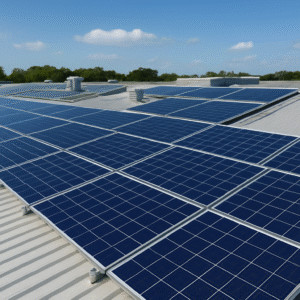
Solar energy has emerged as a prominent renewable energy source, offering a clean and sustainable alternative to fossil fuels. With the increasing demand for solar panels, it is essential to address the environmental impact associated with their disposal. In this blog post, we will explore the importance of recycling solar panels and discuss the sustainable solutions that are available to ensure a greener future.
Solar panels consist of several components, such as silicon, glass, metal frames, and wiring. Although they have a lifespan of 25 to 30 years, there may come a time when they reach the end of their operational life or sustain damage due to unforeseen circumstances. Improperly disposing of solar panels can have detrimental consequences for the environment due to the presence of hazardous materials like lead and cadmium. To mitigate these risks, recycling solar panels has become an essential aspect of the solar energy industry.
The Benefits of Recycling Solar Panels:
1. Resource Conservation: Recycling solar panels helps recover valuable materials such as silicon, aluminum, glass, and copper. By reclaiming these resources, we can reduce the reliance on virgin materials, thereby preserving natural resources and minimizing the environmental impact of mining and extraction.
2. Waste Reduction: Landfills are already burdened with electronic waste. By recycling solar panels, we can divert them from ending up in landfills. This helps prevent the potential leaching of toxic substances and reduces the overall waste volume.
3. Energy Savings: Recycling solar panels requires less energy compared to producing new panels. By reusing existing materials, we can greatly reduce energy consumption and the associated greenhouse gas emissions, effectively combating climate change.
4. Economic Opportunities: The recycling of solar panels creates job opportunities within the recycling industry. It fosters innovation, promotes sustainable practices, and contributes to the development of a circular economy where waste is minimized and resources are maximized.
The Recycling Process:
The recycling process for solar panels typically involves the following steps:
1. Collection: Solar panels are collected from various sources, including residential, commercial, and utility-scale installations. Recycling programs and dedicated collection centers play a vital role in facilitating the collection process.
2. Preprocessing: After being collected, the panels are transported to recycling facilities where they are sorted and dismantled. The frames, glass, and wiring are separated from the silicon cells.
3. Shredding and Separation: The silicon cells are shredded into small pieces, and various techniques, including thermal or mechanical processes, are used to separate the different materials, such as silicon, glass, and metals.
4. Material Recovery: The recovered materials undergo additional refining processes to eliminate impurities and prepare them for reuse in the manufacturing of new solar panels or other applications.
5. Disposal of Residual Waste: Following the recycling process, any remaining waste is disposed of in accordance with regulatory guidelines, ensuring minimal impact on the environment.
How to Promote Recycling of Solar Panels:
1. Awareness and Education: By raising awareness among consumers, solar panel manufacturers, and installers about the importance of recycling and the available recycling programs, we can drive responsible disposal practices.
2. Government Support: Governments can play a significant role in promoting solar panel recycling and encouraging manufacturers to adopt sustainable practices through the implementation of policies and regulations. Additionally, providing incentives for manufacturers can further drive the adoption of these sustainable practices.
3. Industry Collaboration: Collaboration among solar panel manufacturers, recyclers, and research institutions can foster the development of innovative recycling technologies and create a robust infrastructure for the recycling of solar panels.
4. Extended Producer Responsibility (EPR): By implementing Extended Producer Responsibility (EPR) programs, manufacturers can be held accountable for the proper recycling and disposal of their products, including solar panels. This ensures that the end-of-life management of solar panels is done in a responsible and environmentally-friendly manner.
By embracing recycling as an integral part of the solar energy industry, we can harness the power of renewable energy while minimizing our ecological footprint. Let us prioritize the recycling of solar panels, paving the way for a greener and more sustainable future for generations to come. Together, we can create a world where clean energy and responsible waste management go hand in hand.
If you are interested in renewable energy, we highly recommend reading more blogs on these topics on our website. (www.akuntha.com).



